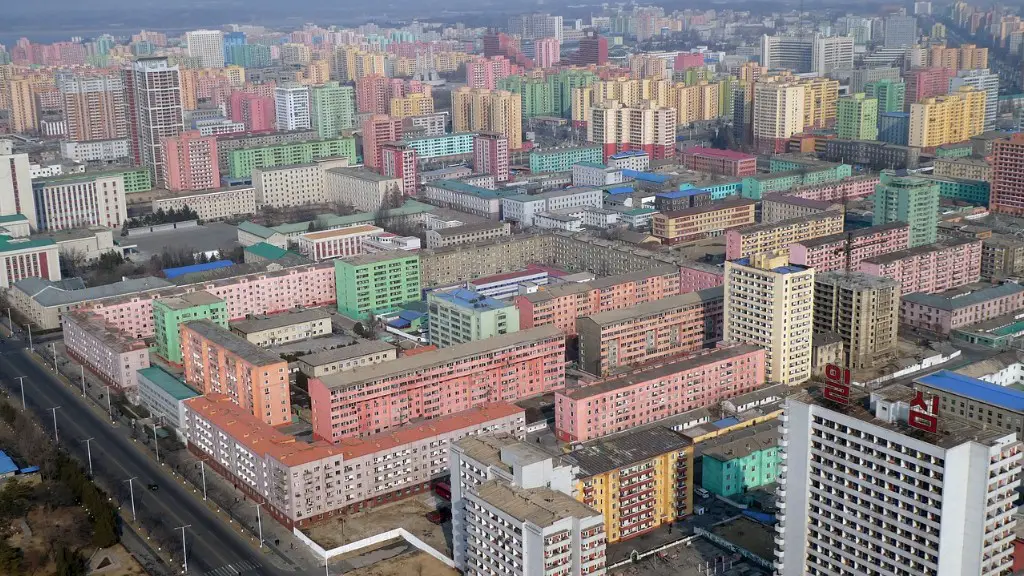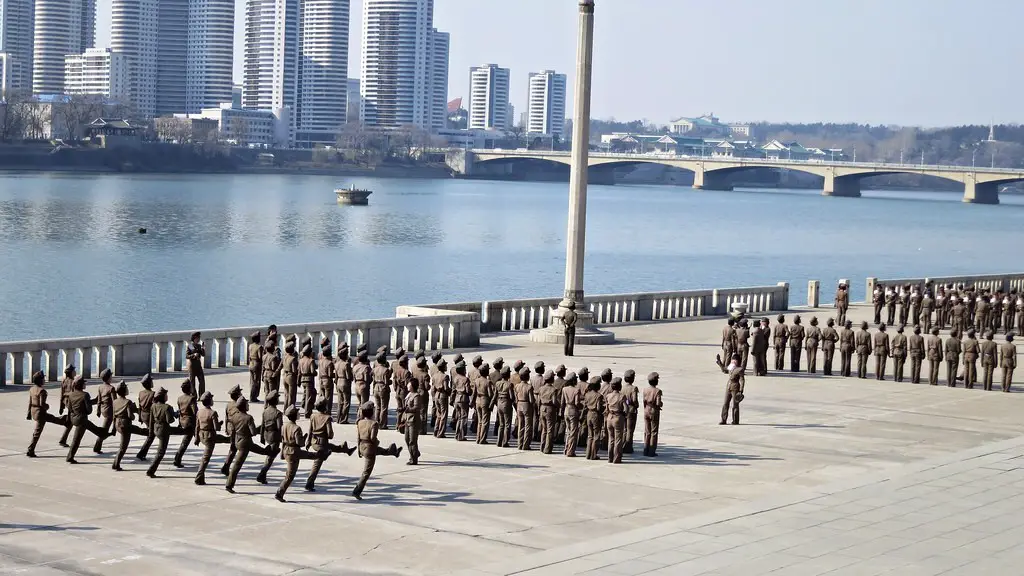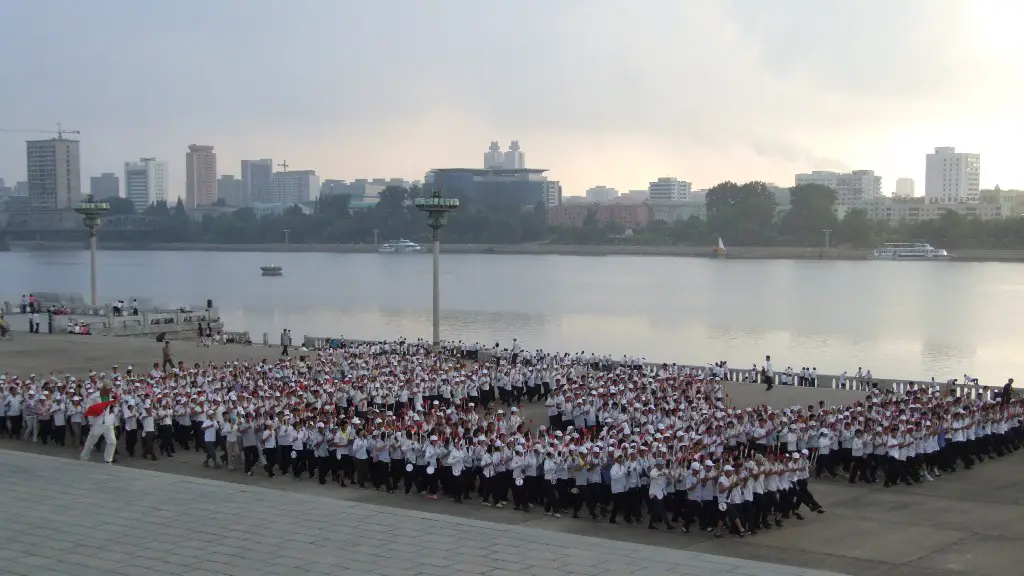Can We Defeat North Korea?
North Korea’s political strategies of militarism and brinkmanship have kept the international community in suspense for years. With provocations ranging from inhumane prison camps to nuclear weapon development, the tiny country is frequently seen as a serious international threat. In spite of global efforts to isolate Pyongyang, the regime has held its own against the global community. So, the question remains: Can we defeat North Korea?
From a pure military standpoint, the answer is a resounding yes. It is estimated that the US and its regional allies, including South Korea and Japan, have 250,000 troops in the area, compared to North Korea’s 1.2 million soldiers. North Korea’s much-vaunted nuclear arsenal is also relatively meager. Experts estimate that North Korea has between 10-20 bombs, arming some five to ten of their delivery vehicles. As such, US and its allies have the upper hand in terms of weaponry and manpower.
However, the answer is not so simple. A military victory, even with overwhelming firepower, will not be a complete solution. The prospects of a Korean civil war suggest that in a best case scenario, casualties would still be high, and the economic impact devastating. South Korea’s capital, Seoul, with its population of 25 million, is located just a few miles from the Korean Demilitarized Zone, making it an easy target for North Korean forces.
Furthermore, all of this assumes that North Korea’s nuclear arsenal can be neutralized without retaliation. This is, however, an unlikely scenario as firing a single nuclear weapon by the North with uncertain aim can cause tremendous destruction in the south that would making any victory far less complete than expected.
On the other hand, the international community has another method at its disposal to bring pressure on the hermit kingdom: economic sanctions. For years, the US and the UN have been slapping North Korea with increasing levels of sanctions, primarily aimed at weakening Kim Jong Un’s rule. The UN estimates that since 2017, the sanctions have cut North Korea’s export revenues by roughly $2 Billion.
The recent efforts of North and South Korea to defuse tensions and re-initiate talks has been met with cautiously optimistic enthusiasm, but lingering skepticism. To make sure these talks are successful and achieve the international community’s long-term goal of disarming North Korea, powerful allies such as the US and China need to set aside differences and cooperate in good faith as a strong message for Pyongyang.
Though North Korea is certainly considered a rogue state, its leaders cannot be ignored or written-off. Thinking of the North Korean regime as some kind of a faceless monster are not only alarmist, but also erroneous. The citizens of North Korea are said to be some of the most loyal and dedicated people on the planet. This illustrates that any solution needs to focus on reconciliation while seeking justice.
The Impact of Sanctions
Sanctions alone are unlikely to topple North Korea, as the country’s mix of traditional agriculture combined with a vertical economy allows it to shield itself from most international pressures. The country already had a working nuclear program when tougher sanctions were imposed in 2006, and since then it has only become better at nurturing indigenous technologies and black-market methods to evade sanctions.
Moreover, the effects of sanctions are not limited to the economic sphere. It is believed that sanctions may further weaken civil society, leading to a further decline in human rights and living standards for the population. This will only serve to bolster negative sentiment towards the international community and fuel anti-Western sentiment in the long run.
Additionally, the sanctions are not being evenly felt across the entire country. Although certain industries have been hard hit, some of the wealthiest sectors are largely unaffected. This also means that people with closer ties to the powerful ‘Kim Family’ can still reap the advantages of personal wealth and political power.
The question then is, can sanctions alone bring North Korea to the table? So far, the answer has been no. The Kim dynasty has proven to be incredibly resilient in the face of UN-imposed restrictions and has shown no signs of weakening, even with increasing pressure.
Therefore, the effectiveness of sanctions in bringing North Korea to the table is disputed. The international community must also look to other methods, such as negotiations, to ensure that the North Korean regime is willing to relinquish its nuclear weapons and end its aggressive foreign policy.
The Role of China
A key factor in any solution to the North Korean crisis is the role of China. As the region’s primary economic superpower, Beijing has the leverage and influence to bring Pyongyang to the table, something that the US alone could not do.
China has so far taken a cautious approach, hesitating to step in too forcefully. This is primarily to avoid a conflict and to ensure that any negotiations remain at a low level. It is believed that China would prefer to allow for a resolution between North and South Korea without its direct involvement.
Nevertheless, Beijing does understand the importance of security in the region. Should the situation worsen, it is likely that China will intervene to ensure the safety of its people and interests. This also means that if China decides to back a solution, the entire Korean Peninsula will benefit from increased economic growth and diplomatic stability.
Nevertheless, China is not the only superpower that wields influence in the region. The US, Russia and Japan must also be considered as important players in any resolution to the security crisis. However, each of these countries has their own interests in the region, and in some cases, these interests could be in direct conflict. This could be seen as a potential roadblock in terms of finding a solution.
Potential Outcomes
Ultimately, the potential outcomes to North Korea’s hostile foreign policy vary greatly. Every nation holds its own solution to the crisis, ranging from regime change to diplomatic talks. The US still holds much of the cards in terms of military and economic firepower, but even then its actions must be cautiously coordinated with its allies.
In the end, a Korean civil war is not the most preferred outcome. Such a conflict would not only be devastating to the Korean people, but would draw in many of its neighbors and cause instability in the region. This could lead to a massive refugee crisis, economic meltdown and risk China’s involvement.
On the other hand, economic sanctions may not be enough to bring about regime change. In some cases, economic sanctions have the effect of building resentment and entrenching the current regime rather than facilitating meaningful change. Further, the UN’s sanctions regime is rife with loopholes, as many powerful nations have commercial interests in North Korea.
In the best case scenario, negotiations could lead to a lasting peace. If North and South Korea reach an agreement on the future of the peninsula, it could serve as a blueprint for the denuclearization of the North, bringing with it much-needed stability to the region. Of course, this is a lofty goal, and much trust and cooperation is necessary to bring it to fruition.
The Role of the US
While all of the other countries involved in the crisis have a vested interest, much of the action continues to involve the US as the primary leader. Even though the US has long been involved in the region and has a keen interest in stability and the knowledge of how to achieve this, many fear that Washington’s overarching goal remains to destabilize North Korea and force a regime change.
The US faces immense pressure from the international community to prioritize diplomatic solutions over military interventions. Members from the United Nations, the European Union and other international organizations have continually criticized Washington for putting too much emphasis on its own military strength, rather than multi-national dialogue.
Still, the US cannot—and should not—try to resolve the issue on its own. The US must be willing to compromise with North Korea and treat it as an equal partner in talks, rather than as an adversary to be subdued. This is a tall order, as many in Washington are heavily invested in the conflict and have their own interests they intend to push.
A Complex Situation
North Korea presents a complex challenge to the international community. On the one hand, it is an isolated and aggressive regime, with a threatening nuclear arsenal and a willingness to flaunt international rules. However, it is also a state that has been shut off from the world for decades and is now in the throws of a significant transition towards modernity.
The path towards stability on the Korean Peninsula will be a long and winding one. All sides must come together, in good faith, to negotiate and work towards mutually-beneficial outcomes. This will be a tough task, especially considering the importance each side places on their own interests. However, by setting aside differences and recognizing that peace, stability and economic prosperity can come out of a just peace, we may very well be able to defeat North Korea.





